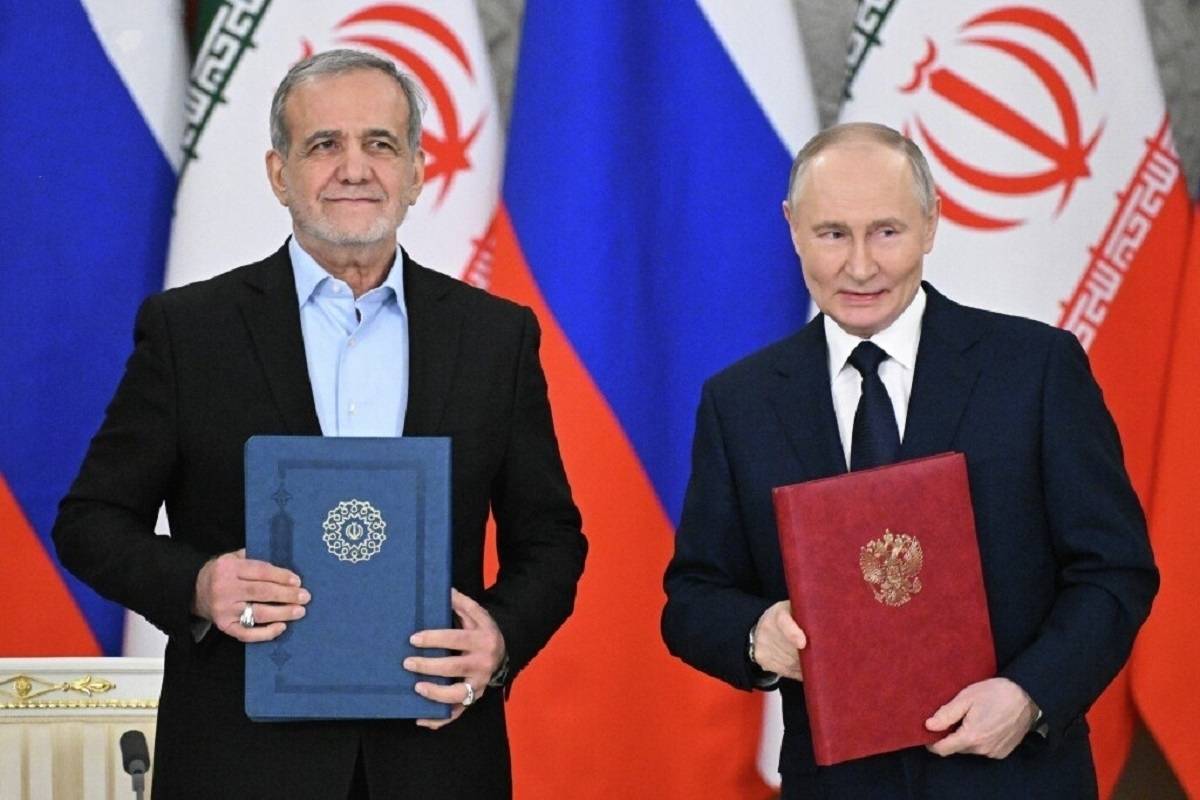890 Views
Sanctions Backfire: How Iran and Russia Turned Western Pressure into Strategic Power
Following the European Union’s hostile decision to reinstate its pre-2015 sanctions against the Islamic Republic of Iran—taken under the shadow of Washington’s coercive and interventionist policies and Zionist influence, and echoing the same accusations repeatedly made by American officials—the European troika has sought to trigger the so-called snapback mechanism against Iran’s economy.
In response, Tehran and Moscow have strengthened their relations at an accelerating pace, forging a deeper partnership that has further solidified their strategic alliance.
In recent years, as both countries have faced a new wave of unilateral and unjust Western sanctions, their cooperation has expanded across military, economic, and political dimensions. This growing collaboration culminated in the signing of a Comprehensive Strategic Cooperation Agreement, elevating Iran–Russia relations to a new level of strategic depth encompassing economic, political, defense, and military fields.
In this regard, Iranian Oil Minister Mohsen Paknejad, at the 18th meeting of the Iran–Russia Intergovernmental Commission on Trade and Economic Cooperation, stated that Tehran and Moscow intend to implement their mutual agreements, which outline the framework for long-term bilateral cooperation.
Similarly, Sergey Tsivilev, Russia’s Minister of Energy, emphasized that this strategic document has opened a new horizon in Tehran–Moscow relations and that with the signing of this high-level treaty, bilateral ties will be elevated across multiple dimensions.
Experts believe that this partnership spans crucial areas such as oil and energy technology, joint projects with Gazprom, establishing a gas hub for swap operations, advancing the North–South Transport Corridor, expanding railway construction, developing modern banking infrastructure for cross-border payments, and enhancing industrial and agricultural collaboration. All these initiatives reflect the expanding and institutionalized nature of Iran–Russia cooperation.
Through the formation of an anti-Western axis, Tehran and Moscow seek alternatives to reshape the balance of global power and challenge the U.S.-led world order. Iran views Russia as a reliable strategic partner in this effort. Their joint activities in regions like Syria and the Caucasus have elevated both countries’ geopolitical influence, while regular political and military exchanges have further consolidated their bilateral relations.
The growing strategic alignment between Iran and Russia has contributed to the emergence of a new anti-Western bloc in Eurasia—one that could ultimately alter the regional balance of power.
According to numerous analysts, one of the main drivers behind this deepening partnership is, ironically, Washington’s own coercive policies. The United States’ aggressive actions toward independent nations have, in practice, pushed Tehran and Moscow closer together—reducing the impact of sanctions and rendering many of them ineffective.
Indeed, as the U.S. reimposes unilateral sanctions against Iran and the European troika follows suit, the Tehran–Moscow relationship has not only reached a strategic level but has also strengthened an independent, anti-Western coalition that increases the geopolitical weight of both countries regionally and globally.
Iran’s long experience in resisting Western pressure shows that the more the West intensifies its unfair actions, the more countries like Iran turn inward to reinforce their domestic capabilities and form effective alliances of resistance.
Today, this strengthened partnership has evolved into a comprehensive collaboration that extends beyond regional calculations. The Iran–Russia axis is becoming a cornerstone of a movement both nations define as a new multipolar world order —an order aimed at fundamentally challenging U.S. hegemony.
Overall, Tehran and Moscow’s cooperation in the aftermath of the West’s renewed sanctions represents a conscious effort to restructure international relations around sovereignty, regionalism, strategic pluralism, and interregional convergence. The main driving force behind this alignment lies in their shared experience of resilience against Western sanctions.
Both nations view sanctions not as legitimate tools but as instruments of geopolitical coercion —and in response, they are crafting a new model for global resilience: one based on cooperation, domestic development, and collective resistance to economic and political pressure.
In short, Tehran and Moscow are not merely reacting to Western pressure—they are rewriting the rules of engagement in the post-Western era and actively reshaping the global balance of power.
Translated by Ashraf Hemmati from the original Persian article written by Navid Daneshvar
https://mronline.org/2025/08/02/iran-confronts-europes-trigger-mechanism-with-eurasian-allies-at-its-side
https://www.aljazeera.com/news/2025/1/18/iran-russia-analysis-syria-setback
https://dolat.ir/detail/461761#
https://tass.com/economy/1949421

Comment
Post a comment for this article